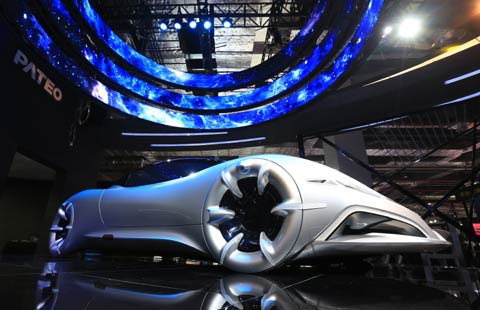Sino-US nuclear cooperation proposal lauded
Updated: 2015-04-23 10:07
By ZHENG XIN in New York and PU ZHENDONG in Beijing(China Daily USA)
|
||||||||
The 30-year Sino-US nuclear cooperation agreement proposed by US President Obama can play a key role in international nuclear safety, security and nonproliferation, experts said.
"The US Nuclear Energy Industry urges Congress to support renewal of the US-China Section 123 agreement for continued US leadership and influence in the critical international nuclear issues,"said Marvin Fertel, the Nuclear Energy Institute's president and chief executive officer.
Fertel urged the US not to forfeit gains and opportunities from the bilateral commercial nuclear cooperation and suggested the agreementbe "promptly renewed by the two countries on mutually acceptable terms".
The deal, which was outlined in a formal letter to Congress, allows the transfer of material, reactors, components and technology between the two nations for 30 years, after the current 30-year agreement expires in December.
Obama proposed the agreement on Tuesday to Congress, which has three months to study it.
"The proposed agreement provides a comprehensive framework for peaceful nuclear cooperation with China based on a mutual commitment to nuclear nonproliferation,"Obama wrote in the letter to Congress.
"Renewing the existing 123 agreement, which is scheduled to expire in December 2015, is essential for continued US nuclear energy cooperation with China,"Fertel said.
"This cooperation easily can bring with it billions of dollars of US exports in goods and services, involve many US supply and sub-supplier companies across the country, and create tens of thousands of American jobs,"Fertel said.
Shen Dingli, a professor of international relations at Fudan University in Shanghai, said China's urgency to transform its energy consumption structure combined with US motivation to boost its economy will further accelerate collaboration in peaceful utilization of the nuclear energy.
"Washington froze bilateral cooperative initiatives in the 1990s for fear that Beijing would develop advanced nuclear weapons using the sensitive technology and hasbeen rigorously observing their anti-proliferation obligations,"he said.
Shen said, however, that China needs to set up roughly 1,000 nuclear power plants to realize its climate commitment in the next 15 years, which is a vast market that holds many commercial gains and opportunities that no country wants to miss.
According to the Nuclear Energy Institute, China has been implementing an expansive national plan to develop up to 58 gigawatts of nuclear energy generation by 2020; 150 gigawatts by 2030; and considerably more by 2050, in response to soaring electricity demand and its severe air-quality challenges. At the same time, China will be the single largest market for nuclear technology, goods and services.
It already is building 26 nuclear energy facilities, including four Westinghouse AP1000s, a design that has been standard for many of China's planned nuclear facilities.
For China, the agreement also will enable the country to deploy the safest nuclear technologies.
"US assistance in developing China's nuclear energy program also is helping China to mitigate its world-leading carbon emissions and other pollution,"said Fertel.
"US equipment and technology exports have enabled China to deploy the safest nuclear technologies,"he said."The strong US presence in China's nuclear energy market and China's adoption of US technology has served to deepen its relationship with the United States that has brought about significant advances in China's safety practices.”
Lin Boqiang, director of the China Center for Energy Economics Research with Xiamen University in Fujian province, said the success of the agreement hinges on whether the US will transfer sufficient nuclear materials and new technology to China and address problems encountered in previous projects.
"Although China has mastered the basic technology for the third generation of nuclear power plants, the country still lacks the nuclear resources and the high-end, energy-efficient technology,"Lin said.
Contact the writer at zhengxin@chinadaily.com.cn
 Volcano erupts in southern Chile, belching ash, smoke into sky
Volcano erupts in southern Chile, belching ash, smoke into sky
 Across Canada (April 24)
Across Canada (April 24)
 Ten photos you don't wanna miss - April 23
Ten photos you don't wanna miss - April 23
 Concept cars in spotlight at Shanghai auto show
Concept cars in spotlight at Shanghai auto show
 US returns ancient artifacts to Egypt
US returns ancient artifacts to Egypt
 Unusual libraries around the world
Unusual libraries around the world
 Chinese real estate deals in US topical forum
Chinese real estate deals in US topical forum
 Weird stuff you can buy on Taobao
Weird stuff you can buy on Taobao
Most Viewed
Editor's Picks

|

|

|

|

|

|
Today's Top News
Sino-US nuclear cooperation proposal lauded
Nuclear cooperation proposal lauded
Furious 7 on track to be tops in China
As PayPal split looms, eBay plans to think small
China loves almonds from water-thirsty California
China sustains US cities: Bloomberg
Real estate investors may switch focus: panel
Obama submits nuclear energy cooperation deal with China
US Weekly

|

|






